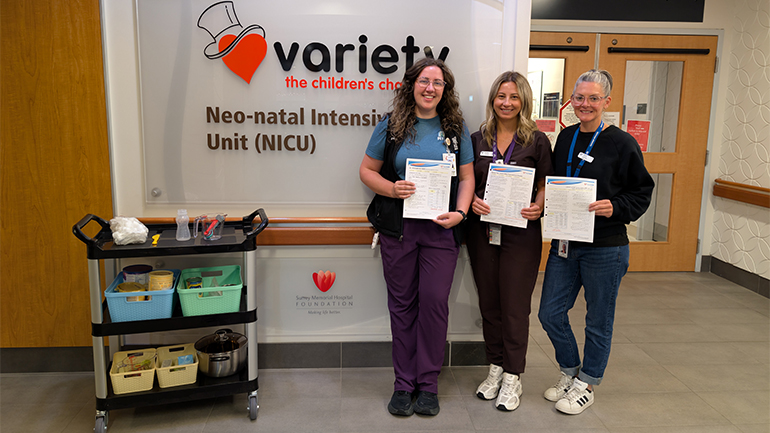
Part three of our Knowledge Translation (KT) Challenge series features the Fortification Enhancing Education at Discharge (FEED) project. Developed by pediatric and Neonatal Intensive Care Unit (NICU) dietitians at Surrey Memorial Hospital, FEED is empowering families with hands on learning and resources needed to safely support their infant’s nutrition and growth at home.
Photo (L-R): Erin Starman, pediatric dietitian; Kaila Jabs, NICU dietitian; Sara de Roy, NICU and pediatric dietitian supervisor.
Being a master chef in your own kitchen doesn’t necessarily set you up for success when it comes to ensuring a newborn is getting the nutrients they need to thrive. Babies with complex medical needs may require additional calories and nutrients added to human milk or formula – known as fortified feeds.
“Those first few weeks at home are really difficult for a lot of families,” says Erin Starman, pediatric dietitian, Children’s Health Centre, Surrey Memorial Hospital. “A little more than one-third of families who live in Surrey speak languages other than English at home, so we really need to ensure our education meets their learning needs. We know that verbal communication alone is not as effective, which increases the risk for fortification errors at home.”
Erin points out that babies may experience complications such as poor growth, dehydration and gastrointestinal issues if fortified feeds are mixed incorrectly.
Thanks to support from Surrey Hospitals Foundation and Michael Smith Health Research BC, Erin and her colleagues, Kaila Jabs, NICU dietitian, Sara de Roy, NICU and pediatric dietitian supervisor and Rebekah Sandhu, research dietitian, along with patient partners, are creating online multilingual instructional videos to demonstrate proper fortification techniques.
“For about seven years, I’ve wanted to have translated videos for families to have a reference for fortifying feeds to support them when they bring their baby home,” says Kaila. “Transitioning a baby from hospital to home is challenging enough, so we really want to ensure families are well supported with clear and concise instructions.”
In addition to creating new online videos to support caregivers, the Knowledge Translation (KT) Challenge team has already put together a hands-on teaching cart that visits new parents while they are preparing to take their newborn home. Stocked with mock human milk and fortification ingredients, along with measuring tools and supplies, these resources allow caregivers to practice mixing fortified feeds at bedside—helping to ensure accuracy and safety when they return home and increasing their confidence to mix fortified feeds.
“Some people don’t measure ingredients; they just cook to taste,” says Kaila. “Not all families use standard measuring spoons at home, so it’s helpful to have the cart and videos to show them. We even have spoon sets we can provide to families until they purchase their own for home,” she adds.
For Erin and Kaila, the KT Challenge was incredibly rewarding. “We are continuously trying to improve the information we provide to families when they leave the hospital,” says Kaila. “We have already seen such positive change with the teaching carts, and we are excited to offer the videos to provide even better support.”
Once complete, the instructional videos will be accessible to caregivers and health care providers across the Fraser Health region.
Learn more about the KT Challenge.
Read other stories in our series:
